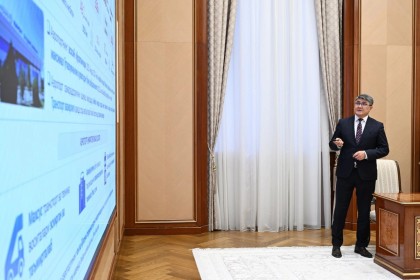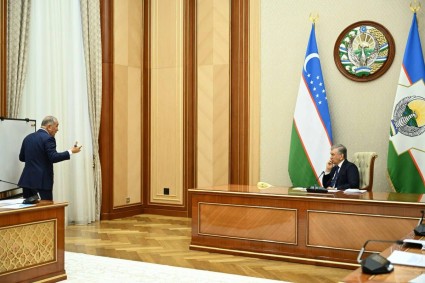The signing ceremony of the Agreement on Strategic Partnership in the Development and Transfer of Green Energy between Uzbekistan, Kazakhstan and Azerbaijan took place today on the margins of the COP29 Climate Summit in Baku, the press service of the President of Uzbekistan said.
President Shavkat Mirziyoyev, speaking at the ceremony, emphasized that renewable energy is not an economic goal, but a contribution to the future, the testimony to the sense of responsibility to future generations.
The parties highlighted the environmental significance of the project. "The power that will be transmitted is wind and solar energy, a renewable and clean source that will mitigate the impact on the climate. Thus, the parties support joint efforts to protect the climate within the framework of the Paris Agreement and the Sustainable Development Goals," the statement said.
Shavkat Mirziyoyev emphasized that the countries participating in the "green energy corridor", possessing significant renewable energy resources, can make a significant contribution to the global energy transition.
He underscored that Uzbekistan ha–≤ adopted a large program for the —Л—Ж—И–∞–µ development of green energy. Every year, the country commissions about 2 GW of solar and wind power generation capacity. By the end of this year, an additional 2.6 gigawatts of renewable generation and a 300 MW energy storage system will be connected to the grid. By 2030, it is planned to increase the share of renewable energy sources to 40%, as well as create energy storage systems for 4.2 GW.
Shavkat Mirziyoyev expressed confidence that the economic effect of the implementation of the project being launched wouldbe felt by all its participants - tens of thousands of jobs will be created, energy infrastructure will be developed, technological and business ties will expand, and the main result will be an increase in the standard of living of the population, he underscored.
He underscored the importance of accelerating the implementation of the project, including the creation of a joint venture, the development and approval of technical documentation and other procedures.
In conclusion, the head of state reiterated Uzbekistan's commitment to the joint implementation of this regional project.
President of Azerbaijan Ilham Aliyev speaking at the ceremony, expressed the opinion that the signing of the agreement is a historic event that strengthens relations between the countries.
"Today's agreement that we signed opens up new opportunities for cooperation between the regions of Central Asia and the Caucasus. And, in essence, the integration processes, processes related to transport, energy, trade of the regions of Central Asia and the Caucasus, today allow us to say that these two regions act synchronously in many issues, including in the field of green energy development," he underscored.
"We know about the big plans and the results already achieved in creating renewable energy sources in Uzbekistan, Kazakhstan, and Azerbaijan. That is, we are going, so to speak, on a parallel course, and the construction of an electric cable along the bottom of the Caspian Sea is cooperation not only between our three countries, but also cooperation on a larger scale," the head of Azerbaijan said.
"Yesterday, in my speech at the conference, I spoke about Azerbaijan's plans, which are already in the process of being implemented, to build a cable from Azerbaijan along the bottom of the Black Sea to Europe. The feasibility study for this project is nearing completion, and thus we will connect Central Asia, the Caucasus, Europe, the Caspian Sea and the Black Sea with a single energy corridor," Ilham Aliyev emphasized.
In his speech, the President of Azerbaijan expressed gratitude to the Minister of Energy of Saudi Arabia, Prince Abdulaziz bin Salman Al Saud, who was present at the ceremony.
"The ACWA Power company, which I spoke about yesterday, is our good partner, investor and operates both in Azerbaijan and in Central Asia. Therefore, today after this ceremony there will be another ceremony that expands our cooperation. This is the Middle East, Central Asia, the Caspian region, the Caucasus, the Black Sea, Europe."
As reported by the press service of the leader of Azerbaijan, with the participation of the presidents of Azerbaijan, Kazakhstan and Uzbekistan, an Executive Program was also signed between the ministries of energy of Azerbaijan, Kazakhstan, Uzbekistan and Saudi Arabia on cooperation in the field of development and transfer of green energy.
Commenting on the launch of the project, President of Kazakhstan Kassym-Jomart Tokayev underscored that this event will mark "a new page in the history of a common desire for sustainable development."
"The strategic partnership agreement opens up new opportunities for the integration of the energy systems of our states, as well as the creation of reliable corridors for the supply of environmentally friendly energy to the European and other markets. Kazakhstan plays an extremely important role here as a large transit territory," said Kassym-Jomart Tokayev.
"The practical results of this agreement will also contribute to the development of the Middle Corridor (as the Trans-Caspian transport route is called - ed.) as a "green bridge" connecting our economies. Close cooperation in this key area will intensify the exchange of experience and advanced technologies between the three states and will further strengthen our energy security," the President of Kazakhstan added.
From 2030, Uzbekistan plans to export surplus green power generated in the country to Europe through Kazakhstan and Azerbaijan.
In July, in Astana, Uzbekistan, Azerbaijan and Kazakhstan signed the Minutes on the project to create Central Asia-Azerbaijan-Europe green energy corridor. A memorandum of cooperation on the integration of energy systems was signed in the spring at an investment forum in Tashkent.
Deputy Minister of Energy Umid Mamadaminov stated on the sidelines of the European Economy Days in Tashkent on November 6 that in 2030 Uzbekistan will have the ability to export 10-15 billion kWh of electricity abroad.














